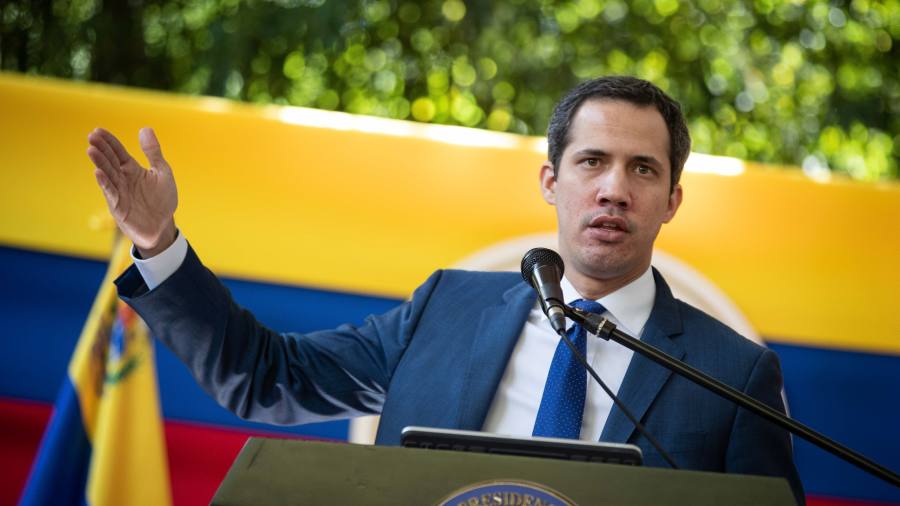
Venezuela’s opposition parties are discussing a plan to wind up their “interim government” and abandon Juan Guaidó’s claim to be the country’s legitimate leader — belated recognition that the US-sponsored attempt to unseat President Nicolás Maduro has failed after nearly four years.
The end of Guaidó’s “interim government” would close the chapter on one of the world’s more bizarre diplomatic experiments. A coalition of more than 50 mainly western nations established formal relations with a shadow opposition administration to try to force regime change in Caracas after allegations that Maduro had rigged his re-election in 2018.
It could also pave the way for the US to ease oil sanctions on the Maduro government, opening up an alternative source of supply for western nations boycotting Russian crude due to its war in Ukraine.
“It has been decided to redesign everything without Guaidó as interim president,” a senior figure in one of the parties in the opposition alliance told the Financial Times. “There is an overwhelming conviction among the majority [of the opposition] that the figure of Guaidó and the interim government is at odds with reality.”
Three of the four main parties in the Unitary Platform opposition alliance — Primero Justicia, Acción Democrática and Un Nuevo Tiempo — backed the move and had a majority of votes to push ahead with it, the person added.
Asked about the discussions, a spokesman for Guaidó said: “There is not a clear position among the groups in the Unitary Platform about the continuation of the interim government.”
Leopoldo López, a leader of the fourth main party in the alliance, Guaidó’s Voluntad Popular grouping, confirmed that “there’s been a debate and there’s some support for [scrapping the interim government]” but added: “We don’t agree. We think this would be an unfortunate decision which implies recognition of Maduro.”
A third senior Venezuelan opposition figure confirmed there had been discussions about whether to continue with a mandate for the interim government, and he hoped a decision would be taken within two weeks. Senior officials from Primero Justicia and Acción Democrática did not respond to requests for comment and an Un Nuevo Tiempo official said the party would agree its position in the coming days.
A US state department spokesperson said Washington recognises Guaidó as interim president and was co-ordinating with his administration and the Unitary Platform on the steps needed to restore democracy to Venezuela.
The political manoeuvring among the opposition coincides with a desire by the US and Europe, Guaidó’s main backers, to explore new sources of oil to replace Russian crude, which has been hit by sanctions implemented by the west.
Venezuela has the world’s biggest oil reserves and used to pump more than 3mn barrels per day. However, years of mismanagement, the expulsion of most foreign oil companies and US sanctions on the country’s crude have reduced output to well below 1mn barrels per day.
The prospect of securing significant extra oil supplies has lent urgency to a process of re-evaluating options on Venezuela, which was already under way in several western capitals.
Spain’s socialist foreign minister José Manuel Albares met Maduro’s chief diplomat Carlos Faría in New York during last month’s UN General Assembly to discuss “energy issues of mutual interest”, triggering protests from Spanish opposition politicians that he was “whitewashing the dictatorship because of oil”.
Earlier this month, US media reported that the administration of Joe Biden was considering easing oil sanctions on Venezuela in return for steps towards democracy, amid a growing realisation that the Donald Trump-era policy of “maximum pressure” on Venezuela had failed.
In a move with few diplomatic parallels, the Trump administration announced in January 2019 that it would recognise Guaidó as Venezuela’s president, after a declaration to that effect by members of the opposition-controlled National Assembly. The EU and many Latin American nations followed suit, hoping the diplomatic pressure would help trigger regime change.
The US closed its embassy in Caracas and evicted Maduro’s ambassador from his diplomatic residence in Washington. Trump invited Guaidó as a special guest of honour to his State of the Union speech to Congress in 2020 and declared him the “true and legitimate President of Venezuela”.
Yet almost four years after Guaidó was declared “interim president”, Maduro remains in power, aided by backing from Russia, China, Cuba and Iran. More than 6mn people have fled the country, triggering the worst refugee crisis ever in the Americas and piling pressure on Biden over illegal migration ahead of November’s US midterm elections.
Meanwhile, divisions opened up within the Venezuelan opposition over whether to participate in elections and continue renewing the mandate of Guaidó’s administration, which had no power within the country but controlled some Venezuelan assets overseas. In December 2021, Guaidó’s foreign minister, Julio Borges, quit, saying the interim government should be dismantled.
Support for Guaidó has already ebbed within Latin America, as a new crop of leftist leaders came to power and dropped recognition of his interim government, calling instead for negotiations with Caracas.
Voluntad Popular’s López, who led an unsuccessful uprising with Guaidó in Caracas in 2019 and spent over a year sheltering in the Spanish embassy under diplomatic protection before fleeing to Spain, said the west risked repeating the mistakes on energy policy it made with Russia.
“Some European governments are suggesting the need to advance an energy agenda with Maduro,” he said. “It’s incredible, given the vulnerability of Europe and its dependence on Russian energy that people are now suggesting depending on an alternative dictatorship such as Maduro’s.”